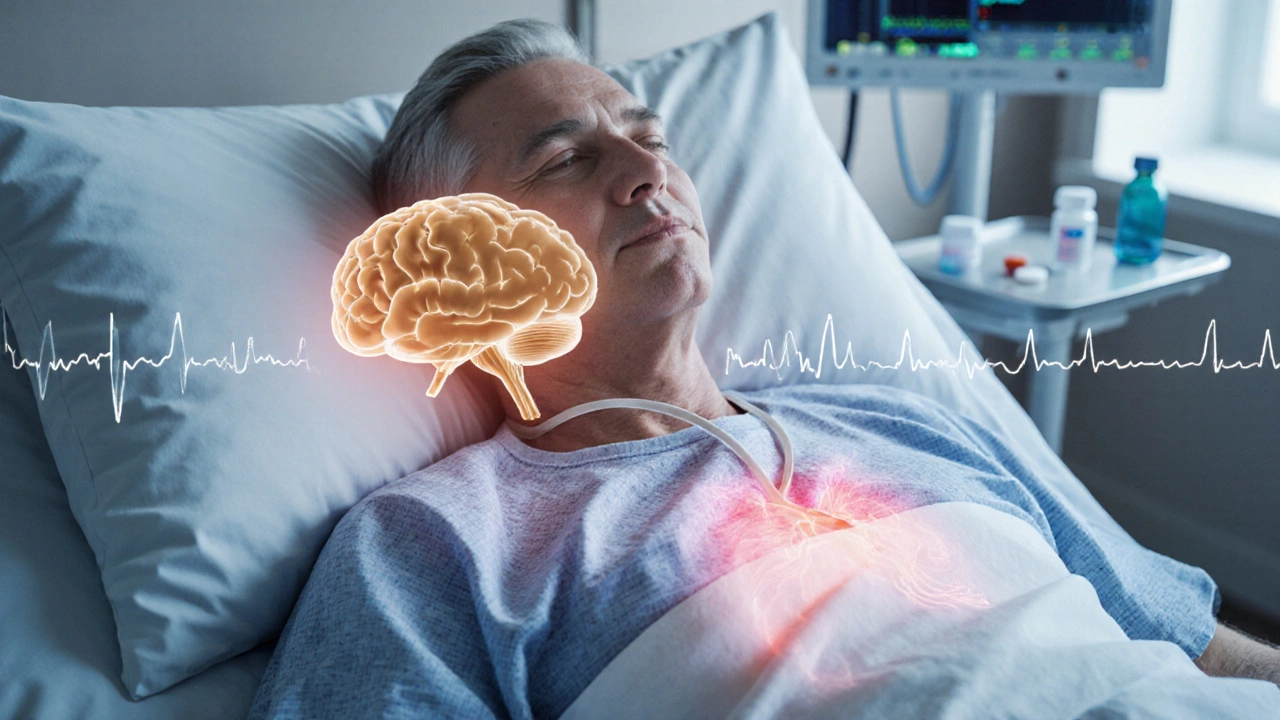
Post-Heart Surgery Anger Tracker
Track your daily symptoms using the form below. Based on your inputs, we'll identify potential triggers and provide evidence-based coping strategies from the article.
This tool helps you recognize patterns and communicate more effectively with your medical team.
Key Takeaways
- Anger after open‑heart surgery is often rooted in pain, medication side‑effects, hormonal shifts, and the emotional trauma of the operation.
- Inflammation and altered cortisol levels can directly affect your brain’s anger circuits.
- Common culprits include opioid analgesics, beta‑blockers, and disrupted sleep patterns.
- Effective coping combines medical review, counseling, gentle exercise, and sleep hygiene.
- Seek professional help if anger is intense, frequent, or leads to risky behaviours.
Recovering from a major operation feels like stepping into a new world. Open‑heart surgery is a life‑saving procedure that opens the chest to repair or replace heart structures. While the heart itself may be fixed, many patients report a surge of irritability, short‑temperedness, or outright rage during the weeks after coming home. This isn’t just “being grumpy” - it’s a genuine neuro‑physical response that can interfere with rehab and relationships.
What makes emotions swing after a heart operation?
When the body undergoes a major surgery, a cascade of physiological changes starts immediately. The stress response releases catecholamines (like adrenaline) and cortisol, priming you for a fight‑or‑flight mode. At the same time, the heart‑lung machine, anesthesia, and post‑operative ventilation can temporarily alter brain oxygen levels. All these factors converge on the limbic system, the brain’s emotion hub, making it easier to snap at minor annoyances.
Physical triggers that can fuel anger
Pain is the most obvious driver. Even with modern pain regimens, the sternum incision, chest tubes, and internal stitches generate constant discomfort. Pain signals travel along spinal pathways that also communicate with the amygdala, the part of the brain that processes fear and aggression. When you’re in pain, the amygdala’s alarm bells ring louder, and patience wears thin.
Inflammation spikes after any invasive procedure. Cytokines such as interleukin‑6 (IL‑6) and tumor‑necrosis factor‑alpha (TNF‑α) flood the bloodstream to start healing. Unfortunately, these same cytokines can cross the blood‑brain barrier and affect neurotransmitter balance, often reducing serotonin and increasing glutamate - a recipe for irritability.
Medication side‑effects add another layer. Opioids, while essential for acute pain, can cause mood swings, anxiety, and delirium, especially in older adults. Beta‑blockers, routinely prescribed after bypass or valve surgery to lower heart‑rate, may blunt emotional expression but also lead to fatigue and depressive‑like symptoms that masquerade as anger.

Hormonal and neurochemical upheaval
The hypothalamic‑pituitary‑adrenal (HPA) axis goes into overdrive during surgery. Cortisol, the primary stress hormone, can remain elevated for weeks. High cortisol interferes with the prefrontal cortex’s ability to regulate impulsive reactions, meaning you’re more likely to lash out before thinking.
At the same time, dopamine levels can dip as the brain adjusts to reduced physical activity and altered sleep. Low dopamine is linked to reduced motivation and increased frustration, which often appears as sudden anger toward caregivers or family members.
Psychological factors you can’t ignore
The operating room is a high‑stakes environment. Even if the surgery goes perfectly, the experience can feel traumatic. Fear of mortality, uncertainty about recovery, and the sudden loss of independence create a mental load that the brain stores as emotional tension.
Many patients also encounter ICU delirium or post‑intensive‑care syndrome (PICS). Hallucinations, disorientation, and rapid mood swings are common when you’ve spent days on a ventilator. While most delirium resolves within a week, the lingering anxiety often fuels irritability during the first month at home.
Sleep disruption and lifestyle shifts
Recovery guidelines ask you to avoid heavy lifting, limit caffeine, and take frequent medications. These changes can disturb your normal bedtime routine. Night‑time pain, the need to sit up for breathing, or the sound of heart monitors can fragment sleep. Sleep deprivation reduces serotonin production, heightening the risk of anger outbursts.
Physical inactivity also matters. Light movement promotes circulation, reduces inflammation, and releases endorphins. When you’re confined to a hospital bed or a couch for weeks, you miss out on those natural mood‑boosters.

Practical steps to tame post‑surgery anger
Talk to your medical team. If you suspect a medication is the culprit, ask about dose adjustments or alternatives. Non‑opioid analgesics, low‑dose antidepressants, or short‑term anxiety meds can smooth the emotional roller‑coaster.
- Track your triggers. Keep a simple log: note time of day, pain level, medication taken, and mood. Patterns often emerge, showing whether a specific drug or activity spikes anger.
- Adopt gentle breathing exercises. Slow diaphragmatic breathing activates the vagus nerve, lowering heart‑rate and cortisol. Even five minutes three times a day can create a calmer baseline.
- Engage in light activity. Begin with seated marching, ankle pumps, and short walks as soon as your surgeon clears you. Movement stimulates endorphin release and reduces inflammatory markers.
- Prioritize sleep hygiene. Use a recliner that keeps your chest upright, wear an eye mask, and limit screen time an hour before bed. If nighttime pain wakes you, discuss a scheduled low‑dose pain medication to avoid sudden spikes.
- Seek counseling or support groups. Cardiac rehab programs often include psychologists who understand the dual physical‑emotional recovery. Talking about fears can prevent them from turning into anger.
- Mind your diet. Omega‑3‑rich foods (salmon, walnuts) can lower cytokine production, while excessive sugar may worsen mood swings.
When anger signals a deeper issue
If you notice any of the following, it’s time to get professional help promptly:
- Anger episodes that last longer than 30 minutes or happen several times a day.
- Thoughts of self‑harm, aggression toward others, or reckless behavior.
- Persistent low mood, loss of interest, or feelings of hopelessness lasting more than two weeks.
- Physical symptoms like rapid heart‑rate, high blood pressure, or chest pain that appear during angry outbursts.
These signs may indicate post‑operative depression, anxiety disorder, or an adverse reaction to medication that needs re‑evaluation.
Putting it all together
Feeling angry after a heart operation is not a personal failing; it’s a predictable blend of pain, chemicals, sleep loss, and emotional shock. By recognizing the underlying causes-whether it’s a lingering pain, a medication side‑effect, or the stress hormone spike-you can take concrete steps to calm the storm. Combine medical adjustments with breathing, movement, and supportive conversation, and you’ll protect both your heart and your relationships during the crucial healing window.
Why do painkillers sometimes increase irritability after heart surgery?
Opioids bind to receptors in the brain that control both pain and mood. While they dampen physical discomfort, they can also lower serotonin and dopamine levels, leading to mood swings, anxiety, and short‑lived anger. Adjusting the dose or adding a non‑opioid adjunct often restores balance.
Can beta‑blockers cause anger or mood changes?
Beta‑blockers slow heart‑rate and reduce blood‑pressure spikes, but they may also cause fatigue, sleep disturbances, and low mood. In some people, this translates into irritability. If symptoms are pronounced, doctors may switch to a different class or add a low‑dose antidepressant.
What simple breathing technique helps calm post‑surgery anger?
Try the 4‑4‑6 method: inhale through the nose for a count of 4, hold for 4, then exhale slowly for 6. Repeat five times. This activates the parasympathetic nervous system, lowering cortisol and calming the amygdala.
When should I contact my surgeon about my anger?
If anger interferes with your daily routine, causes conflict, or is paired with chest pain, rapid heartbeat, or thoughts of self‑harm, call your surgeon or cardiac rehab nurse right away. Early intervention prevents complications and helps you stay on track with physical recovery.
Is there a link between cortisol levels and post‑operative anger?
Yes. Elevated cortisol after major surgery hampers the prefrontal cortex’s ability to regulate impulsive reactions. Managing stress through meditation, adequate sleep, and, if needed, short‑term corticosteroid‑sparing medication can reduce this effect.





Rohan Talvani
I am a manufacturing expert with over 15 years of experience in streamlining production processes and enhancing operational efficiency. My work often takes me into the technical nitty-gritty of production, but I have a keen interest in writing about medicine in India—an intersection of tradition and modern practices that captivates me. I strive to incorporate innovative approaches in everything I do, whether in my professional role or as an author. My passion for writing about health topics stems from a strong belief in knowledge sharing and its potential to bring about positive changes.
view all postsWrite a comment